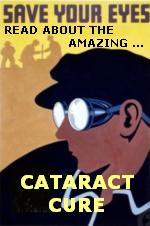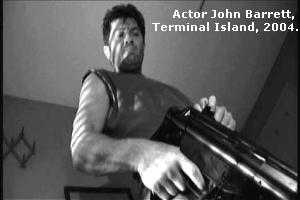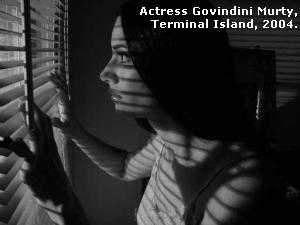|
Home
About
Us
Bookstore
Links
Blog
Archive
Books
Cinema
Fine Arts
Horror
Media & Copyright
Music
Public Square
Television
Theater
War & Peace
Affilates
Horror Film Aesthetics
Horror Film Festivals
Horror Film Reviews
Tabloid Witch Awards
Weekly Universe
Archives






|
HOLLYWOOD LOVES TERRORISTS, HATES DIVERSITY -- SO
THEY BLACKLISTED ME!
by Thomas M. Sipos, managing editor.
[May 6, 2004]
 [HollywoodInvestigator.com]
Hollywood "liberals" are blacklisting him because he's made a film that's
not sympathetic to Muslim terrorists -- and are also complaining that his
script was "too white"! [HollywoodInvestigator.com]
Hollywood "liberals" are blacklisting him because he's made a film that's
not sympathetic to Muslim terrorists -- and are also complaining that his
script was "too white"!
Those are some of the shocking
accusations of conservative filmmaker Jason A. Apuzzo, as stated in an exclusive interview with the Hollywood Investigator.
Apuzzo's Terminal
Island tells the tale of a bounty hunter (actor John Barrett) tracking
a Muslim terrorist who blows up buildings while stalking Sita (actress
Govindini Murty) in and around L.A. Harbor. Shot on digital video
for $7,000, the film runs at 82 minutes.
Apuzzo
co-wrote Terminal Island with Murty, his wife. "Soon after I got out of the USC Cinema School, Govindini and I shopped
a script, The Terrorist, to about 10 prominent
art-house film companies," said Apuzzo. "We were told flat-out: If
your story has anything to do with 9-11, we won't consider it.
"Our story
had nothing to do with 9-11, specifically, so they looked at the script,
and some even said they liked it, but they wanted it rewritten. They
didn't like that Muslim terrorists were the villains. They wanted
us to instead explain the terrorists' motivations, see things from their
point of view, make them more sympathetic. One of the companies was
then dealing with Robert Redford, so they couldn't possibly consider anything
in which a terrorist might get killed.
"They
also didn't like our multicultural cast. They wanted a lot more white
people -- after all, Redford was watching!"
An odd
accusation, considering Hollywood's liberal reputation -- a reputation
that Apuzzo both confirms and laments. The Investigator asked Apuzzo
if those were the exact words used by development executives. Did
they actually say the terrorists should be "more sympathetic"? Did they specifically request "more white people" and a cast that
was "less multicultural"? Were those their exact words?
Apuzzo
unambiguously replied: "Yes."
 Apuzzo continued: "They
wasted months of our time with this kind of 'development advice' before
informing us they weren't interested at all, because the subject matter
was too explosive, no matter how much we reworked it. Bottom line:
We had no prayer of getting funding to do a movie sympathetic to the War
on Terror. Apuzzo continued: "They
wasted months of our time with this kind of 'development advice' before
informing us they weren't interested at all, because the subject matter
was too explosive, no matter how much we reworked it. Bottom line:
We had no prayer of getting funding to do a movie sympathetic to the War
on Terror.
"So we
wrote a completely different story, Terminal Island.
It'd be much grittier, more hardcore, and we'd shoot it ourselves. This time, nobody was going to tell us what we could say. We designed
the film so that it could be shot on a micro-budget around L.A. Harbor,
where I was living. We began with almost no budget, with everyone
working for free. Eventually, we threw about $7,000 at it from our
own pockets. My father was a tremendous help, as were credit cards.
"We created
a
terrorist-villain who is a Wahabi Muslim. We depict the misogyny
motivating much of Islamic terrorism, and we make fun of liberals, the
INS, even Clinton. There's also an argument made for interventions
like the Iraq war -- get terrorists over there, before they come here. There's plenty of stuff for a good Hollywood liberal to hate."
 Whatever the makeup of The
Terrorist's cast, Terminal Island is
mostly white. The bounty hunter, terrorist, Sita's boyfriend, and
her INS boss are all white, at least as seen in black & white. (Despite shooting on digital video, Apuzzo released Terminal
Island on black & white, opting for a noir look.) Murty
(in the role of Sita) is the only "multicultural" actor in a lead role. [See Apuzzo's response.] Whatever the makeup of The
Terrorist's cast, Terminal Island is
mostly white. The bounty hunter, terrorist, Sita's boyfriend, and
her INS boss are all white, at least as seen in black & white. (Despite shooting on digital video, Apuzzo released Terminal
Island on black & white, opting for a noir look.) Murty
(in the role of Sita) is the only "multicultural" actor in a lead role. [See Apuzzo's response.]
"We shot
the
film on mini-DV, using a Canon
XL-1. Because it's such a great camera in low-light, we didn't
need expensive lighting packages for our nighttime shoots -- important,
because almost the entire film occurs at night. We didn't need crews
for the lighting packages. So we could shoot discreetly, guerrilla-style,
without calling attention to ourselves."
Guerrilla
filmmaking is common among low-budgeters, and generally refers to filming
without a permit. A cast and crew infiltrate a location, quickly
taking their shots before getting caught, then depart. Terminal
Island's locations include a public mall and wharfs.
 "One night
the crew of Dreamworks's Seabiscuit called
the cops on us, without even asking whether we had a permit," complained
Apuzzo. "A funny thing, considering their movie was about an underdog
who beats the odds." He added sardonically, "I'm sure no one on their
crew ever shot a film guerrilla-style..." "One night
the crew of Dreamworks's Seabiscuit called
the cops on us, without even asking whether we had a permit," complained
Apuzzo. "A funny thing, considering their movie was about an underdog
who beats the odds." He added sardonically, "I'm sure no one on their
crew ever shot a film guerrilla-style..."
Terminal
Island was edited and mixed in Final
Cut Pro, on my iMac. We showed the trailer at the L.A.
Final Cut Pro User's Group, and got an enthusiastic response. Nobody believes we did it for $7,000. This year's Sundance winner also had a $7,000 budget.
"Terminal
Island is a product of the digital revolution, a revolution slow
in the making but profound in its consequences, because it's embraced by
people forced to work outside Hollywood's production system."

* Critical Reviews
Terminal
Island is technically proficient, its crisp black & white
images, canted frames, and period Duke
Ellington scores evoking 1955's Kiss
Me Deadly. The acting is competent, if unremarkable. About
as good as on most straight-to-video exploitation films. The same
is true of the script, which, despite a few good lines, has its share of
flat dialogue and clichéd situations. Most impressive are
Apuzzo's Mac-produced special effects of exploding buildings (see above). Least impressive is his terrorist.
Apuzzo's
terrorist is not only unsympathetic, he's uninteresting. His few
lines are mostly spoken over cell phones. He wears a hooded sweat
suit throughout the film, which, along with the murky lighting, obscures
his face. From what little we see, he's thirtyish white guy, with
a sandy beard & moustache.
Oddly,
he behaves less like a terrorist than a slasher. Jason-like, he single-handedly lifts a burly man off the ground by the neck, then knifes him. When not bombing buildings, he mostly stalks "slutty" women. He eschews
guns, preferring a knife, garret, and poker iron. And he refuses
to die, arising after being "killed." Yet he lacks the charisma of
a Jason
Vorhees or Michael
Myers, evoking the nondescript slasher in Final
Exam.
Not that
anyone would confuse Terminal Island, which
Apuzzo calls a "suspense thriller," with a slasher film. Although
both slashers and Wahabis are reputedly mysogynistic, the slasher motifs
in Terminal Island appear inadvertent and
unconscious. But it's curious to note how deeply "the slasher" has
seeped into the cultural subconscious over the past 25 years, influencing
other film genres.
Conservative
film critic & radio talk show host Michael
Medved raves about Terminal Island, providing
blurbs for Apuzzo's DVD box.
Said Medved: "Jason
Apuzzo shows stylish flair as a director that belies the limitations of
his shockingly modest budget. The camera work, editing, and inventive
touches suggest considerable savvy and unexpected wit on the part of an
able and ambitious filmmaker."
About
Murty, Medved said: "Govindini Murty displays undeniable star power. From every
angle, in every mood, the camera loves her and she glows on the screen
... She possesses the sort of exotic and potent appeal combined with unmistakable
intelligence that should guarantee a spectacular success."
To the
Investigator, Apuzzo added: "Govindini was a successful stage actress and
writer in Vancouver, with a B.A. from Yale, before we were married or making
films together."
The DVD
box
has nothing on John Barrett (the bounty hunter). He appears to be
a seasoned actor nearing middle age, offering the film's most skilled performance. Nuanced, though sometimes low on energy, he is best when handling wry humor,
less believable as the tough guy beating up a much younger and bigger man
without breaking a sweat.

* A Blacklisted Conservative?
Apuzzo claims
that "liberal" Hollywood has blacklisted him because of Terminal
Island -- and that his film is being compared to Mel Gibson's The
Passion.
"Our problems
began
when ten elite Hollywood agencies requested to see the trailer, or the
film itself," said Apuzzo. "Soon after we sent the DVDs, we began
getting obscene, harassing, threatening phone calls -- mafia type stuff. We may change our home number. The word we get from inside the system
is we're being blacklisted. Our film is apparently being passed around
as an example of what The
Passion may unleash -- and what therefore has to be squashed. Don't want those conservatives getting uppity, after all!
"It's
not enough these people own Hollywood. They have to destroy anyone
with a different opinion. If you're an independent filmmaker, this
kind of thing is frightening."
Apuzzo
seems to equate opposing Bush's foreign policy with being a liberal. Yet is that valid? Some leftists and liberals supported Bush's
wars (Christopher
Hitchens, The New Republic, Tony
Blair's New Labour) as do otherwise liberal celebs (Dennis Miller),
while some conservatives and most libertarians oppose Bush's wars (The
American Conservative, Chronicles, Liberty, Harry
Browne, LewRockwell, the Libertarian
Party, Libertarians for
Peace, Antiwar.com.) The
term neoconservative -- popularized
by Irving Kristol in 1983 -- has gained usage partly to differentiate
war-conservatives from peace-conservatives.
Are Hollywood
liberals united in opposing Bush's War on Terror, as Apuzzo seems to think?
"We're
getting a little off-subject here," said Apuzzo. "Let me just say
that none of these issues are relevant to our film. None of that
stuff is central to the story. Most people who've seen the film just
find it entertaining. We made no effort to make a controversial film. I don't think Gibson intended a controversial film. Only Hollywood
finds The
Passion to be controversial. Everyone else finds it to
be
a sincere, skillful retelling of the Passion story.
"The point
is, if you do anything that veers from liberal orthodoxy, Hollywood
will pounce on you. We learned [that] from The
Passion. All Gibson did was shoot a relatively conventional,
Catholic Passion-play -- and nearly got lynched for it."

* Strong Feminine Ethnic Women
Apuzzo
makes another charge, as curious and unexpected as his claim that Hollywood
executives disliked The Terrorist's multicultural
cast. He accuses Hollywood of disliking strong feminine women of
color"
"One more
thought on why the Hollywood aristocracy hates our film," Apuzzo said.
"It's basically a woman's film. A woman's hopes and dreams are at
the center of the story. But Govindini's character isn't your typical
Hollywood
man-hating, careerist, blonde WASP harpie-feminist. She's ethnic,
she's intelligent, and she manages to retain her femininity while standing
up for herself. We hadn't realized this would be so controversial,
but our crank callers don't seem to like this very much."

* Conservative Distribution
Apuzzo draws
inspiration from The
Passion, seeing it as demonstrating the potential of independently
distributed conservative films.
"The
Passion has changed everything," said Apuzzo. "It's the
first film launched by the conservative media. Newmarket Films only
needed to spend $15 million marketing it, because it was being discussed
on Rush
Limbaugh, Sean
Hannity, The
O'Reilly Factor, Drudge
Report, Newsmax, Michael
Medved, Michael
Savage, etc. The marketing power of the conservative media is
phenomenal. Look at the sales of conservative books.
"What
conservatives don't seem to realize is that the same thing can happen again
and again if we just encourage other talent. Gibson can't do it alone,
and we can't just wait for the next Bible movie to come out.
"The problem
is, conservatives frequently don't help each other. We backbite and
nit-pick ourselves to death, while the other side laughs. You'd be
sickened by the stories I could tell you about famous media conservatives
stabbing each other in the back.
"The other
problem is that many conservatives prefer Hollywood as a convenient whipping-post,
rather than doing anything. It's easier to go on radio and complain
about Michael
Moore. But if people get the sense that conservatives
can compete, then you have to change the storyline. You have to actually
do something creative, get your hands dirty, rather than just complain."
"Hollywood
will learn nothing from The
Passion. They're too set in their ways, run by media conglomerates
who don't give a rat's ass about personal filmmaking. The
Passion may be the only truly edgy, personal film Hollywood's produced since the
1970s. It's what The
Godfather or The
Exorcist or Taxi
Driver were in their day. All Hollywood wants are franchise films
for teens with disposable income. And all the indies care about is
their liberalism."
Again,
how true is that charge? While indies, like Hollywood, may be dominated
by some definition of liberalism, David Lynch has been open in his praise of Reagan. And indie filmmaker Whit
Stillman has long been a darling of conservatives.
Apuzzo
added that he can work comfortably with liberals. Director Irvin
Kershner (The
Empire Strikes Back) has a cameo
in Terminal Island, playing an informer, and
is given special thanks in the credits. "Kersh is an ardent liberal,"
said Apuzzo. "Actually a Green. But we have no trouble working together."
As for Terminal
Island's distribution history so far, Apuzzo said, "We were turned
down by Cannes. No surprise. Toronto is a ways off, as is Sundance,
but those festivals are so left-wing, we don't have a chance. There's
a conservative film festival being organized in Texas, and they're interested
in spotlighting our film for their Sept. 11th event. We'll see how
that goes.
"Our goal
is theatrical distribution and we're going to get it. Even if it's
just a few screens in big markets. Hollywood needs competition and
we're going to provide it."
About
the cast makeup of TERMINAL ISLAND, Apuzzo responds:
"Al Hayya
happens
to be played by a Lebanese Christian guy whose stage name is Nick Nyon,
but who's actual name is Sam Abraham. As for John Barrett, the bounty
hunter, he happens to be half-Phillipino. And as for the rest of
the cast -- and this could easily have been verified by looking in the credits
-- MOST OF THE CAST IS NON-WHITE.
Sukaro is
played by Reuven Jerzy, a former Israeli fighter pilot. Estelle is
played by Bronwyn Hardy, a black woman, who has a larger role than the
boss (even in black-and-white!). Omar is played by Arash Ghaneian,
who is Iranian. Garcia is played by Lisa Joffrey, who is half-hispanic. The 'checkbook' terrorist was played by Salah Salea, an Iraqi who escaped
Iraq during the Gulf War.
The other
terrorist who breaks in on John's room is played by Sagi Degon, a former
Israeli special forces soldier. Sukaro's dinner guests are played
by: Rajeev Chhibber, who is Indian, and Carlos Castillo, who is Hispanic. In the bar where John picks up the China Seas access card, we had Grace
Chen, a Chinese woman.
We had 20
people in the cast overall, and 9 have no 'white' background whatsoever,
while 3 others (Govindini, John, Lisa) had non-white parents. That
leaves 8 other cast members, half of whom are Jewish (Scott Schwartz, Alex
Stone, Craig Raisner, Irvin Kershner)! So for you to say that the
cast is 'mostly white' is completely misleading. "
Okay, but
the cast still looks mostly white to me (as do many Hispanics, Israelis
and other Middle Easterners, and people of mixed heritage). -- TMS |
| Read the Investigator's
previous report on Jason A. Apuzzo's USC student film about Al
Gore. |
Copyright 2004 by HollywoodInvestigator.com


|
